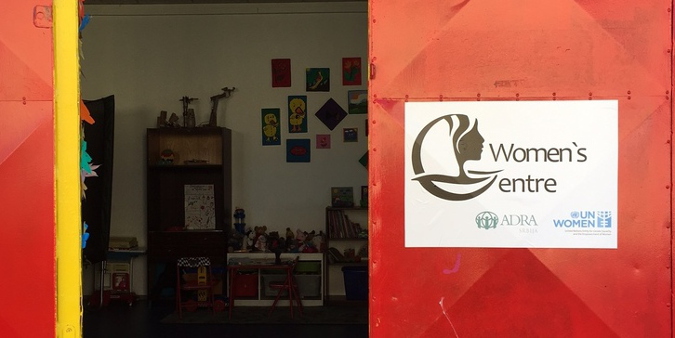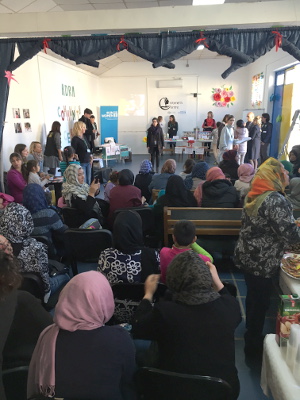A home far away from home in Serbia
Women refugees and migrants in Serbia now have a place of their own, and a support team to help them build a post-conflict life free from violence and poverty.Date:

Women's Center opened its doors to more than 1,000 refugee and migrant women currently residing in Serbia. Photo: UN Women/Bojana Barlovac
A new women’s centre in Belgrade offers refugees and migrants a respite from their travails, and a safe space for building skills for their futures.
More than 1,000 women refugees and migrants currently reside in Belgrade. Few of them have opportunities to develop livelihoods. For those who do work, their options are often limited to low-paying and low-skilled informal jobs. The women also carry the burden of unpaid family labour at home.
Now, with the November opening of the 120-square meter Women’s Centre within the ADRA Community centre in Belgrade, women and girls have a safe place to gather. At the new facility, they can learn how to sew and knit, make decoupage and other decorations for earning income. While vocational training is the most popular activity, women can also take part in sports and even get psycho-social support at the new centre.
“This reminds me of home,” says Jasmin Hamafi*, who comes from Afghanistan. “We used to have our own hall, just for women, where we would gather every other day and organize celebrations, courses, and exercise classes.”

The centre is of importance to the women’s safety and security. On their long journeys to uncertain futures, women refugees and migrants are especially vulnerable to human trafficking, exploitation, discrimination, and abuse. Single women travelling alone or with children, pregnant and nursing women, adolescent girls, and elderly women are among those who are particularly at risk.
Moreover, cultural differences, religious and community traditions and language are additional barriers for women refugees who seek to claim their rights and obtain assistance.
Igor Mitrovic, Director of ADRA, spoke at the official opening of the Centre, where he stressed that refugee and migrant women are not victims, but persons with rights to realize their needs, just like everyone else. “The Women's Center is here to create the conditions for realizing some of their rights, and making their time more useful and beautiful," he said.
Aurelija Djan, who works with refugees with UN Women in Serbia, expressed concern about the lack of adequate services for women and girls refugee and migrants. She explains that the situation has had a profound impact on their sense of safety, dignity and health.
“Not only are women fleeing from war but from male violence as well,” says Djan. “Their circumstances make them more vulnerable to male violence. This is one of the reasons why the Women’s Centre is so important. We hope it will remain as full as it is on opening day, and will bring a smile back to many faces,” said Djan.
Since the start of the migrant crisis in 2015, UN Women in Serbia has supported national institutions and women's NGOs to ensure that women’s specific needs are met. Its work helps to ensure that gender is integrated into Serbia’s planning and response to refugees and migrants.
In 2016, UN Women and Oxfam opened Serbia’s first Women’s Corner in the Refugee Aid Miksaliste transit centre. In addition, working with a mobile team from the NGO, Atina, UN Women has provided timely assistance and self-help workshops to women refugees and migrants in Belgrade, Sid, Subotica, Presevo and in Bogovadja. With support of UN Women and Oxfam, the Belgrade Center for Human Rights drafted a gender analysis to include amendments to Serbia’s draft Asylum Law.
* The name has been changed to protect the identity of the individual.